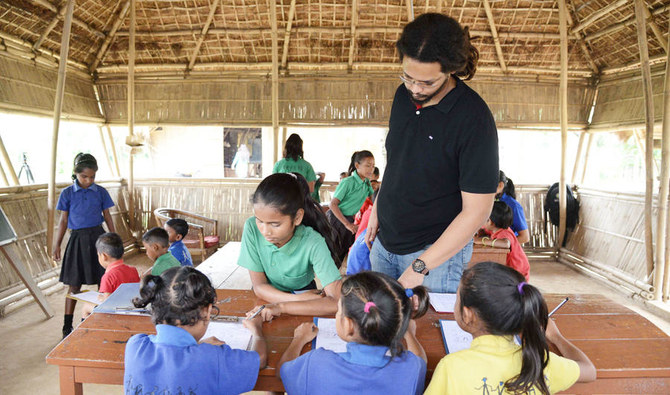
The first green school, “Akshar Foundation”, to accept plastic waste as fees
Date:

Share post:
Innovation has been the buzzword to phase out single-use plastic. Many organizations introduced innovative initiatives to foster plastic-free environments, from road construction to shoes made out of recycled PET bottles. One such initiative that stands out among them is Assam’s green school. Here, student fees are not big bucks but plastic waste. In Pamohi, in the northeastern state of Assam, Akshar Forum school became a game-changer.
The Minds behind the Model
In 2013, Mazin Mukhtar, an aero engineer from New York, returned to India. After working with disadvantaged families in New York, he knew he wanted to serve the underprivileged in India. He contacted ParmitaSarma – a social work student of Tata Institute of Social Sciences (TISS). Together they decided on a paradigm shift in education by improving the performance of government schools.
At that time, most families in Assam preferred their young children to work in quarries. It helped as these kids earned rupees 200 a day instead of attending school. Besides, the local families were too poverty-stricken to pay school fees.
So, Mazin and Parmita developed a novel idea. They requested each child bring in at least 25 plastic items every week as fees. The idea worked, and in 2016, Mazin and Parmita founded the Akshar Forum school with 20 students. Today, the school has over 100 students, 8 bamboo huts for classrooms, and 2 digital classrooms. Funded by Oil India Limited and supported by donations.
But what set this school apart was its plastic fee model that encouraged a sense of community ownership among the students.

The Curriculum
The Akshar school curriculum fundamentally provides underprivileged students with practical skill-based education. Inspired by Mahatma Gandhi’s NaiTalim, or basic education philosophy, Akshar’s curriculum mixes vocational training with conventional academic subjects. The curriculum combines carpentry with mathematics, solar technology with physics, embroidery with economics, teaching with psychology, recycling with ecology, landscaping with biology, etc.
Here is how a typical day at Akshar School looks like: –

Akshar Forum School
Akshar Forum School is a 100-student model school in Assam, India. It does not have an age-specific admission system. The students attend the same classes together while sitting in open spaces. The Akshar Forum model even trains and employs older students as teachers for younger students.
Besides mainstream subjects, the school provides courses in cosmetology, carpentry, embroidery, singing, dancing, organic farming, gardening, animal husbandry, solar paneling, renewable energy, recycling, and essential digital literacy skills.
The school also educates the community through its children about the harmful effects of burning plastic. The teachers also teach children to recycle the plastic waste they bring as fees. They teach them to make sturdy eco-bricks by compressing 20 to 40 plastic packets into a single plastic bottle.
Outside of the classroom, the students manage an animal shelter, too, rescuing and treating injured or abandoned dogs before finding them homes locally.

Spreading Success
The Akshar Forum school model was first used to turn around an under-performing school in Delhi. Now, its innovative teaching methods will extend to five more schools in the next year. Further, Mazin and Parmita have embarked upon a mission to establish 100 such green schools across the country over the next five years.
This teaching model aims to address education and employment together. Its model blends academics with vocational training to ensure the graduating students secure gainful livelihoods and contribute to the green development of their communities.
The Akshar Foundation’s revolutionary model will not only radically improve the performance of government schools but give underprivileged students all the skills they need to build productive lives for themselves. It is the way to a BETTER INDIA!
